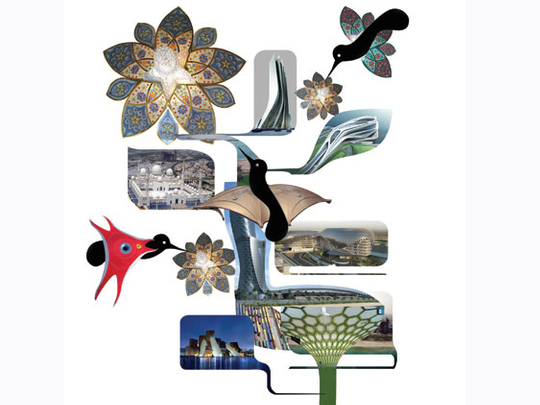
Abu Dhabi, the oil-rich capital of the UAE is rapidly asserting itself as the new centre of activity and creativity in the region. It wants to live its moment in history and hopes to turn the next 10 years into an Abu Dhabi decade where some of the most tantalising initiatives, in education, culture, energy, and economic diversification are expected to come from.
Dubai, the second largest prosperous city in the UAE, has lived long enough under the spotlight. It is now gracefully dealing with the aftermath of the global financial crisis and is going through difficult economic recovery which is bound to take some time. Dubai remains as it has always been a regional catalyst. The city is practically irreplaceable as a service and commercial hub.
Yet Dubai is currently revisiting its model and adapting to new realities and learning the simple fact that the spot never stays in one place for too long. It is already moving westward to neighbouring Abu Dhabi.
This is the new road ahead for the new UAE: as Dubai wisely slows down and rethinks its strategies and redraws its priorities, Abu Dhabi swiftly makes its move to the fast track and picks up the momentum. Both pioneering cities are living an altogether different moment from where they were, prior to 2008.
Turning point
Something really historic happened in 2008/2009 and as a result the UAE 2010 landscape is not what it used to be. The country as a whole and not just Dubai has gone through a turning point. It was a shattering experience for some but a reawakening moment for others. Some got bruised and lost big whereas others did not feel a dent and came out relatively stronger and decided to seize the future.
Of all the big things that have happened during the crucial 2008-2010 period, nothing is more important than the emergence of the new and assertive Abu Dhabi.
Even before the 2008 financial crisis, there was a lot happening in Abu Dhabi that skipped keen local observers. The capital of the nation was obviously thinking and acting differently on the domestic, federal, regional as well as the global arena. Feeling psychologically squeezed by Qatar and Dubai, Abu Dhabi had no choice but to rise to the challenge, flex its muscles and think and act big.
The 2008 world financial crisis was merely the trigger to further consolidate the image as well as the reality of a new Abu Dhabi which has been in the making for quite some time.
It all started with the neat slogan "Abu Dhabi first" which encapsulates the new thinking and conveys so many political messages which are yet to be fully digested. The "Abu Dhabi first" is not necessarily a parochial banner nor is it an inward looking manifesto. It is entails rewriting new rules of the game, enforcing a new social contract and redrawing of the road map for the UAE as the federation celebrates its 40th anniversary.
One thing is for sure, the new Abu Dhabi is acting decisively to change the status quo. Indeed the changed Abu Dhabi is going to be much more daring and ambitious under its new and younger leadership in terms of asserting its own federal and regional agenda.
Energy diversification
The bottom line of the new agenda is that Abu Dhabi wants to be the first in all fields. Just like Dubai, it wants to rebrand itself as a global city. The name of the game once again is: global reach, trendsetter for the region, double digit annual growth, energy diversification, knowledge society, post-oil economy and greater independence.
Yet Abu Dhabi insists that it is not replicating its junior partner in the federation. Abu Dhabi thinks it is a major league player with vast nearly limitless resources. It does not need to borrow beyond its means. It does not want to be a real estate state which was the weakest point in the Dubai model.
It can afford to invest generously in the educational and cultural infrastructures. It is much more institutionalised and has certainly the advantage to learn from its neighbour's numerous mistakes.
Of course there are also many sceptics who dismiss Abu Dhabi as attempting to do too much too fast and too soon.
Whatever the pains associated with the emergence of the different Abu Dhabi, the material gains are certainly beyond doubt. So there is no going back on the fast track growth model which is the essence of Abu Dhabi 2030 master plan.
The ultimate thinking is that the different Abu Dhabi deserves to be the first and live its moment in history. As for everybody else in the neighbourhood, it is time for them to sit put for a while and enviously watch Abu Dhabi's global ascendance.
- Dr Abdulkhaleq Abdullah is a professor of political science at UAE University.










